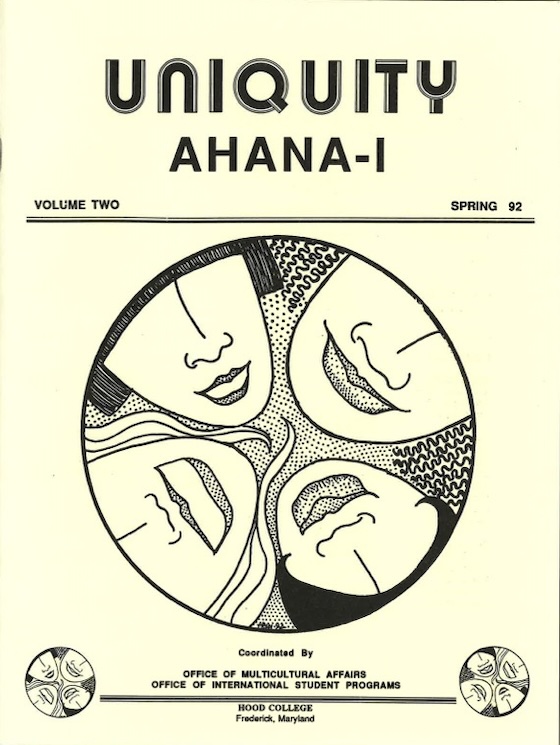A Look Back | Hood’s Multicultural Literary Magazine

Mary Atwell, Hood College archivist, uncovers the story of Uniquity AHANA-I, a student-run multicultural literary magazine.
Hood Magazine Fall 2024
For this issue, I set out to write something previously untold about the Black Student Union. After many hours of searching, I almost admitted defeat because I was not learning anything new. Documentation from student groups is sparse in the archives. The very nature of student clubs is transitory—they rise and fall in popularity as the years go by and student passions change. Sometimes they disappear altogether, but the real problem (for both the archives and incoming students) is that club records often go with the students.
While researching, I came upon “Uniquity AHANA-I,” the first and only official Hood student multicultural literary magazine. Here was my unfamiliar story!
In the early 1990s, Uniquity AHANA-I published student poems, essays, stories and artwork. The Office of Multicultural Affairs and the Office of International Student Programs coordinated the magazine, but the bulk of the work was completed by students identifying as AHANA-I.
A precursor to BIPOC (Black, Indigenous and People of Color), AHANA-I stands for African American, Hispanic, Asian, Native American and International. The editors of the magazineunofficially added an honorary “E” for everyone, as the magazine welcomed submissions from all Hood students. While uniquity, meaning “unique,” is an old word, the editors chose uniquity to mean “unity, equity and uniqueness.”
The inaugural note from editor-in-chief Nicole A. Morris ’94 includes the following passage supporting the aim of the magazine to be all-inclusive:
“Harmony is not only a blending, it is also a diversion. AHANA-I recognizes this. Occasionally, we may fall short of our goal because we have so much to learn about each other. It will be difficult and even painful. Progress usually is. We have co-existed for so long, ignorant of even our own voices, that it will take time to listen to and not feel threatened by that of others.”
Two years later, co-editors LeWan Perry ’94 and Reena Amin ’96 wrote the following:
“We can only be unified if we accept each other as equals. Solidarity, after all, can come only through respect. In addition, togetherness should never cancel out one’s individuality. We are all unique and different. This uniqueness should be expressed and heard by all. Everyone has a voice in this world that deserves to be heard.”
Uniquity AHANA-I ran for five years. I hope you enjoy the excerpts on this page, as we celebrate the 30th anniversary of African American studies and the 50th anniversary of the Black Student Union at Hood.
Contact atwell@hood.edu to further explore the magazine series.
Are you ready to say Hello?
Choose a Pathway
Information will vary based on program level. Select a path to find the information you're looking for!
